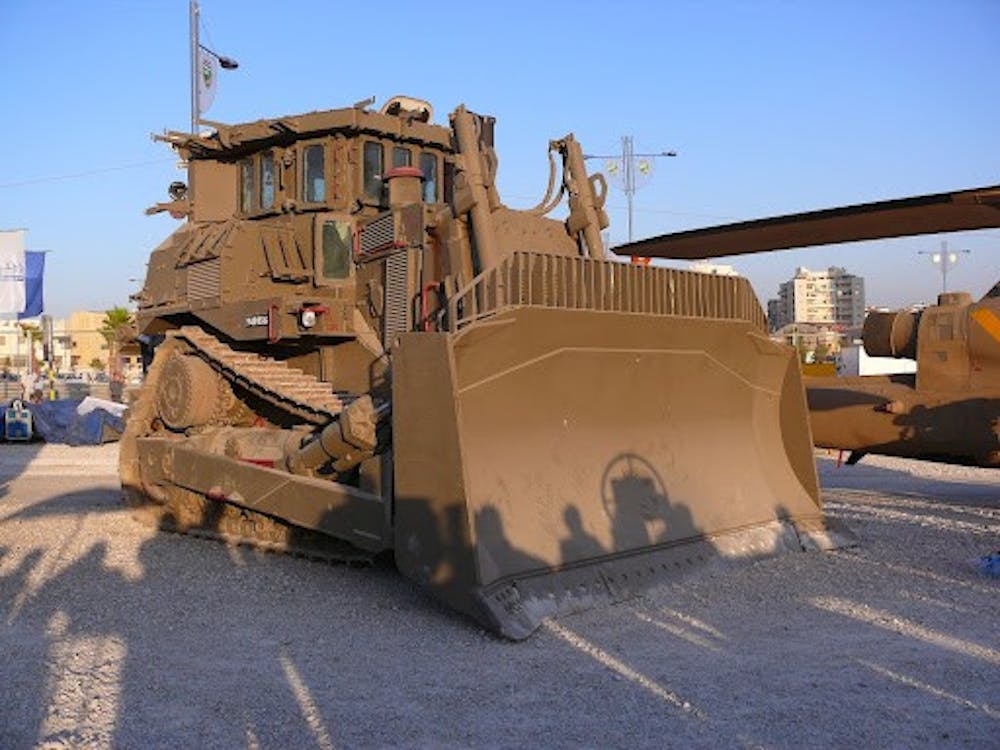The following is a guest contribution and reflects the author’s views alone. For information on how to submit an article to the Opinion Section, click here.
I am a junior at Princeton and a veteran of the Israel Defense Forces (IDF). Even though I’ve learned about the Israeli-Palestinian conflict as a student and as a soldier, I regularly find myself confused by the conflict’s geopolitics, history, and realities. I’m not stupid; I’m just honest. Maybe some students feel like they do have a firm grasp on the intricacies of the conflict. But, in the past few weeks, I’ve been approached by a myriad of students who also feel uncomfortable painting over a century of history with the broad brushstrokes of an oppressor-versus-oppressed narrative.
Like me, these students proudly support Palestinians. Like me, they sincerely hope for peace. And like me, they cannot support Referendum No. 3.
Referendum No. 3, which calls on Princeton University to boycott Caterpillar equipment, effectively reduces the Israeli-Palestinian conflict into a good-side/bad-side schema. According to this narrative, Israelis are stealing land, killing innocents, and destroying property. If one side is so blatantly at fault, then it is easy to categorically condemn the demolition of 18,000 houses by the IDF without investigating the context and narratives surrounding each individual instance.
If you’re skeptical of such a simplistic narrative, I’m with you. However, even if we acknowledge that the conflict is complicated, what does that have to do with Referendum No. 3? Without even hinting at competing narratives, the referendum plucks home demolitions from a web of interconnected controversies. Consequently, it leaves out key facts that should matter to voters.
For instance, we know that Jewish people have lived in Historic Palestine for millennia, and that Palestinian leadership has rejected the two-state solution on multiple occasions. The referendum also glosses over the immensely significant and profoundly relevant death toll on both sides. Since 2000, at least 1,392 Israeli citizens — ranging from a 4-day-old infant to a 92-year-old woman — have been murdered by Palestinian terrorists. The most recent attack was in Tel Aviv this past Thursday, April 7, which I heard about from my pregnant sister and two other friends in Tel Aviv; one friend’s text read “we heard shots and sprinted.” Many of us know about rockets and mortars fired from Gaza — well over 12,000 launched in the past two decades. I have personally watched hundreds fly over my head and towards Israeli cities.
Just as the broader conflict is multi-dimensional, so is Caterpillar’s involvement with Palestinians’ lives, security, and welfare.
Boycotting Caterpillar would harm the Palestinian Tractor & Equipment Company (a designated Caterpillar distributor) which describes itself as “a leading participant in Palestine’s economic and industrial development.” This should strike us as confusing: the referendum simultaneously condemns the demolition of Palestinian homes and tacitly proposes a boycott of a flagship Palestinian construction company. The referendum’s narrow aim leads it to hurt the very people it aims to help.
Moreover, the referendum ignores the fact that Caterpillar machinery is often used to de-escalate violence, not cause it. In the IDF, I frequently worked with Caterpillar D9 tractors to preemptively set structural boundaries for Hamas-orchestrated riots. Without Caterpillar tractors, Israeli soldiers would have to face the impossible task of stopping thousands of people from charging towards Israel’s border at once. I was there. I watched Caterpillar tractors minimize disaster and prevent calamity. The equipment was used to protect the lives of protesters in Gaza and civilians in Israel.
The Israeli-Palestinian conflict is worsened and perpetuated by lopsided narratives and bad-faith arguments. I’m voting no, because this referendum is precisely the kind of performative, empty activism that non-stakeholders use to solve a problem they don’t even realize they scarcely understand.
Jacob Katz is a junior from Boca Raton, Fla. concentrating in Philosophy. He can be reached at jk39@princeton.edu.
Editor’s Note: The ‘Prince’ was not able to independently verify Katz’s claims about his experiences in the Israeli Defense Forces.









